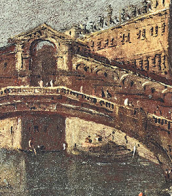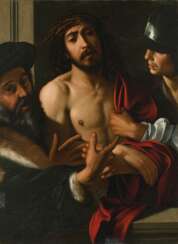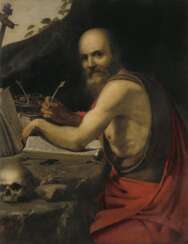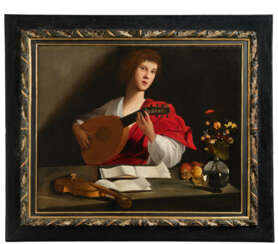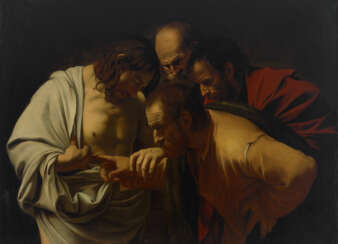микеланджело меризи да караваджо (1571 - 1610)
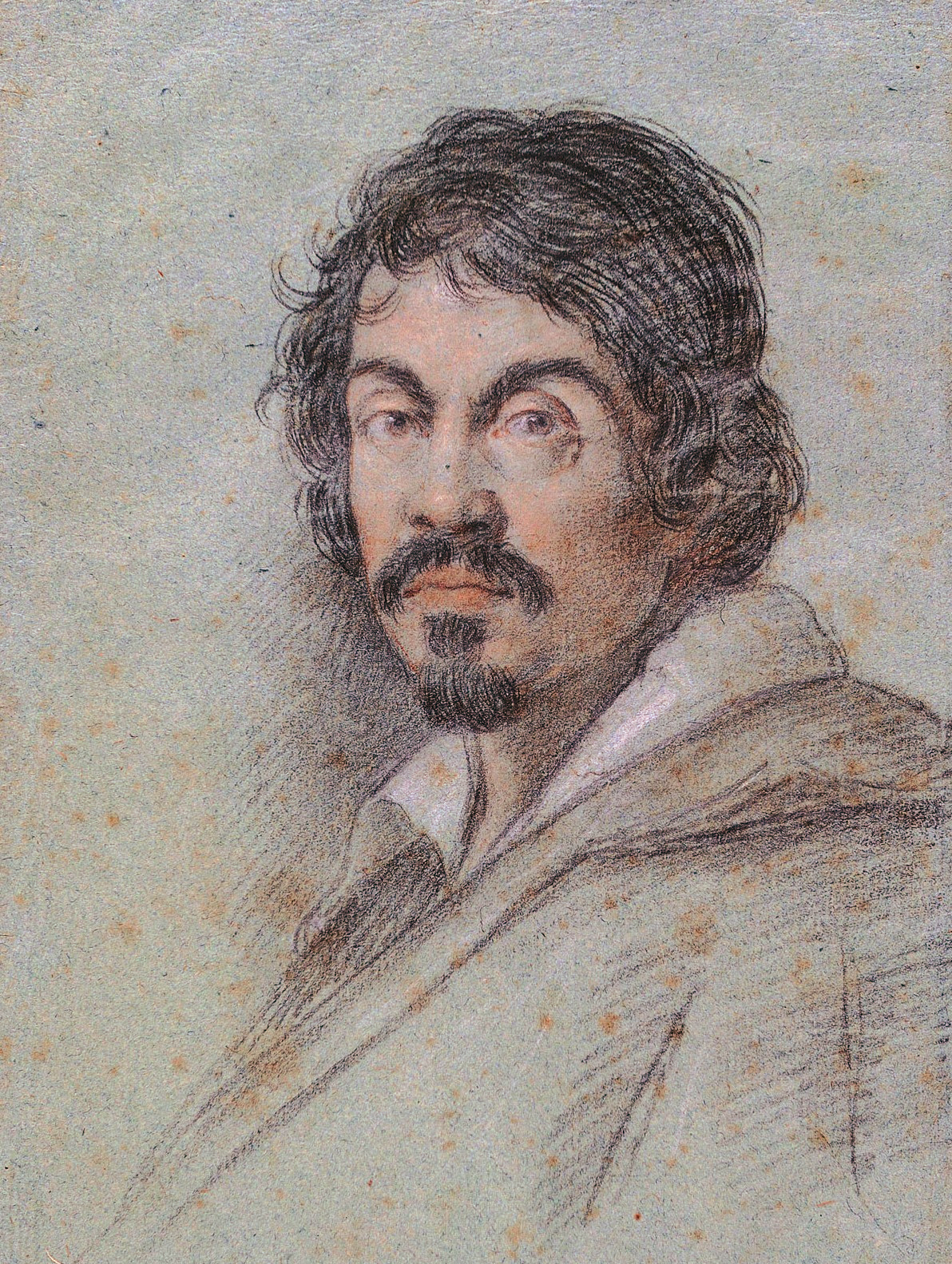
Michelangelo Merisi da Caravaggio, an Italian painter, was a pivotal figure in the transition to Baroque art. Born in Milan or the town of Caravaggio in 1571, his work is renowned for its realistic depiction of human emotion, dramatic use of lighting, and less-than-idealized portrayal of subjects, which broke away from the Mannerist style prevalent at the time.
Caravaggio's life was as dramatic as his art. In 1592, he moved to Rome, where, despite initial hardships, his unique style caught the eye of Cardinal Francesco del Monte, leading to his first public commissions. His success, however, was marred by a tumultuous life filled with brawls and legal troubles. Notably, in 1606, he fled Rome after killing Ranuccio Tommasoni in a brawl, an act that led to a death sentence. He sought refuge in Naples, Malta, and Sicily, continuing to create influential works while attempting to secure a papal pardon.
His most significant contributions to art include introducing a style that combined naturalistic detail with dramatic lighting (chiaroscuro) and psychological realism. This approach had a profound impact on the evolution of Baroque painting. Some of his notable works include "Basket of Fruit," "The Calling of St. Matthew," "The Beheading of St. John the Baptist," and "Supper at Emmaus." These works are characterized by their innovative composition and the intense emotional state they convey.
Caravaggio's fame waned after his death in 1610 under mysterious circumstances while traveling from Naples to Rome. However, the 20th century saw a resurgence in interest in his work, acknowledging his significant influence on Western art.
For collectors and art experts, Caravaggio's works represent a pivotal moment in the history of art, where the transition from Renaissance ideals to Baroque realism is profoundly evident. His paintings can be seen in various museums and galleries, offering a glimpse into the dramatic and emotive potential of art.
To stay updated on sales and auction events related to Caravaggio's works, signing up for updates can be a valuable resource for enthusiasts and collectors. This subscription will provide timely information on new opportunities to acquire pieces linked to this influential and groundbreaking artist.
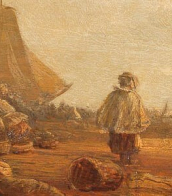

Michelangelo Merisi da Caravaggio, an Italian painter, was a pivotal figure in the transition to Baroque art. Born in Milan or the town of Caravaggio in 1571, his work is renowned for its realistic depiction of human emotion, dramatic use of lighting, and less-than-idealized portrayal of subjects, which broke away from the Mannerist style prevalent at the time.
Caravaggio's life was as dramatic as his art. In 1592, he moved to Rome, where, despite initial hardships, his unique style caught the eye of Cardinal Francesco del Monte, leading to his first public commissions. His success, however, was marred by a tumultuous life filled with brawls and legal troubles. Notably, in 1606, he fled Rome after killing Ranuccio Tommasoni in a brawl, an act that led to a death sentence. He sought refuge in Naples, Malta, and Sicily, continuing to create influential works while attempting to secure a papal pardon.
His most significant contributions to art include introducing a style that combined naturalistic detail with dramatic lighting (chiaroscuro) and psychological realism. This approach had a profound impact on the evolution of Baroque painting. Some of his notable works include "Basket of Fruit," "The Calling of St. Matthew," "The Beheading of St. John the Baptist," and "Supper at Emmaus." These works are characterized by their innovative composition and the intense emotional state they convey.
Caravaggio's fame waned after his death in 1610 under mysterious circumstances while traveling from Naples to Rome. However, the 20th century saw a resurgence in interest in his work, acknowledging his significant influence on Western art.
For collectors and art experts, Caravaggio's works represent a pivotal moment in the history of art, where the transition from Renaissance ideals to Baroque realism is profoundly evident. His paintings can be seen in various museums and galleries, offering a glimpse into the dramatic and emotive potential of art.
To stay updated on sales and auction events related to Caravaggio's works, signing up for updates can be a valuable resource for enthusiasts and collectors. This subscription will provide timely information on new opportunities to acquire pieces linked to this influential and groundbreaking artist.
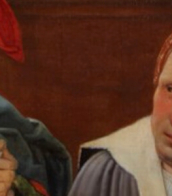

Michelangelo Merisi da Caravaggio, an Italian painter, was a pivotal figure in the transition to Baroque art. Born in Milan or the town of Caravaggio in 1571, his work is renowned for its realistic depiction of human emotion, dramatic use of lighting, and less-than-idealized portrayal of subjects, which broke away from the Mannerist style prevalent at the time.
Caravaggio's life was as dramatic as his art. In 1592, he moved to Rome, where, despite initial hardships, his unique style caught the eye of Cardinal Francesco del Monte, leading to his first public commissions. His success, however, was marred by a tumultuous life filled with brawls and legal troubles. Notably, in 1606, he fled Rome after killing Ranuccio Tommasoni in a brawl, an act that led to a death sentence. He sought refuge in Naples, Malta, and Sicily, continuing to create influential works while attempting to secure a papal pardon.
His most significant contributions to art include introducing a style that combined naturalistic detail with dramatic lighting (chiaroscuro) and psychological realism. This approach had a profound impact on the evolution of Baroque painting. Some of his notable works include "Basket of Fruit," "The Calling of St. Matthew," "The Beheading of St. John the Baptist," and "Supper at Emmaus." These works are characterized by their innovative composition and the intense emotional state they convey.
Caravaggio's fame waned after his death in 1610 under mysterious circumstances while traveling from Naples to Rome. However, the 20th century saw a resurgence in interest in his work, acknowledging his significant influence on Western art.
For collectors and art experts, Caravaggio's works represent a pivotal moment in the history of art, where the transition from Renaissance ideals to Baroque realism is profoundly evident. His paintings can be seen in various museums and galleries, offering a glimpse into the dramatic and emotive potential of art.
To stay updated on sales and auction events related to Caravaggio's works, signing up for updates can be a valuable resource for enthusiasts and collectors. This subscription will provide timely information on new opportunities to acquire pieces linked to this influential and groundbreaking artist.
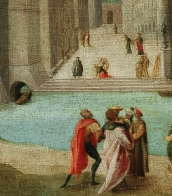

Michelangelo Merisi da Caravaggio, an Italian painter, was a pivotal figure in the transition to Baroque art. Born in Milan or the town of Caravaggio in 1571, his work is renowned for its realistic depiction of human emotion, dramatic use of lighting, and less-than-idealized portrayal of subjects, which broke away from the Mannerist style prevalent at the time.
Caravaggio's life was as dramatic as his art. In 1592, he moved to Rome, where, despite initial hardships, his unique style caught the eye of Cardinal Francesco del Monte, leading to his first public commissions. His success, however, was marred by a tumultuous life filled with brawls and legal troubles. Notably, in 1606, he fled Rome after killing Ranuccio Tommasoni in a brawl, an act that led to a death sentence. He sought refuge in Naples, Malta, and Sicily, continuing to create influential works while attempting to secure a papal pardon.
His most significant contributions to art include introducing a style that combined naturalistic detail with dramatic lighting (chiaroscuro) and psychological realism. This approach had a profound impact on the evolution of Baroque painting. Some of his notable works include "Basket of Fruit," "The Calling of St. Matthew," "The Beheading of St. John the Baptist," and "Supper at Emmaus." These works are characterized by their innovative composition and the intense emotional state they convey.
Caravaggio's fame waned after his death in 1610 under mysterious circumstances while traveling from Naples to Rome. However, the 20th century saw a resurgence in interest in his work, acknowledging his significant influence on Western art.
For collectors and art experts, Caravaggio's works represent a pivotal moment in the history of art, where the transition from Renaissance ideals to Baroque realism is profoundly evident. His paintings can be seen in various museums and galleries, offering a glimpse into the dramatic and emotive potential of art.
To stay updated on sales and auction events related to Caravaggio's works, signing up for updates can be a valuable resource for enthusiasts and collectors. This subscription will provide timely information on new opportunities to acquire pieces linked to this influential and groundbreaking artist.


Michelangelo Merisi da Caravaggio, an Italian painter, was a pivotal figure in the transition to Baroque art. Born in Milan or the town of Caravaggio in 1571, his work is renowned for its realistic depiction of human emotion, dramatic use of lighting, and less-than-idealized portrayal of subjects, which broke away from the Mannerist style prevalent at the time.
Caravaggio's life was as dramatic as his art. In 1592, he moved to Rome, where, despite initial hardships, his unique style caught the eye of Cardinal Francesco del Monte, leading to his first public commissions. His success, however, was marred by a tumultuous life filled with brawls and legal troubles. Notably, in 1606, he fled Rome after killing Ranuccio Tommasoni in a brawl, an act that led to a death sentence. He sought refuge in Naples, Malta, and Sicily, continuing to create influential works while attempting to secure a papal pardon.
His most significant contributions to art include introducing a style that combined naturalistic detail with dramatic lighting (chiaroscuro) and psychological realism. This approach had a profound impact on the evolution of Baroque painting. Some of his notable works include "Basket of Fruit," "The Calling of St. Matthew," "The Beheading of St. John the Baptist," and "Supper at Emmaus." These works are characterized by their innovative composition and the intense emotional state they convey.
Caravaggio's fame waned after his death in 1610 under mysterious circumstances while traveling from Naples to Rome. However, the 20th century saw a resurgence in interest in his work, acknowledging his significant influence on Western art.
For collectors and art experts, Caravaggio's works represent a pivotal moment in the history of art, where the transition from Renaissance ideals to Baroque realism is profoundly evident. His paintings can be seen in various museums and galleries, offering a glimpse into the dramatic and emotive potential of art.
To stay updated on sales and auction events related to Caravaggio's works, signing up for updates can be a valuable resource for enthusiasts and collectors. This subscription will provide timely information on new opportunities to acquire pieces linked to this influential and groundbreaking artist.
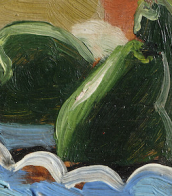

Michelangelo Merisi da Caravaggio, an Italian painter, was a pivotal figure in the transition to Baroque art. Born in Milan or the town of Caravaggio in 1571, his work is renowned for its realistic depiction of human emotion, dramatic use of lighting, and less-than-idealized portrayal of subjects, which broke away from the Mannerist style prevalent at the time.
Caravaggio's life was as dramatic as his art. In 1592, he moved to Rome, where, despite initial hardships, his unique style caught the eye of Cardinal Francesco del Monte, leading to his first public commissions. His success, however, was marred by a tumultuous life filled with brawls and legal troubles. Notably, in 1606, he fled Rome after killing Ranuccio Tommasoni in a brawl, an act that led to a death sentence. He sought refuge in Naples, Malta, and Sicily, continuing to create influential works while attempting to secure a papal pardon.
His most significant contributions to art include introducing a style that combined naturalistic detail with dramatic lighting (chiaroscuro) and psychological realism. This approach had a profound impact on the evolution of Baroque painting. Some of his notable works include "Basket of Fruit," "The Calling of St. Matthew," "The Beheading of St. John the Baptist," and "Supper at Emmaus." These works are characterized by their innovative composition and the intense emotional state they convey.
Caravaggio's fame waned after his death in 1610 under mysterious circumstances while traveling from Naples to Rome. However, the 20th century saw a resurgence in interest in his work, acknowledging his significant influence on Western art.
For collectors and art experts, Caravaggio's works represent a pivotal moment in the history of art, where the transition from Renaissance ideals to Baroque realism is profoundly evident. His paintings can be seen in various museums and galleries, offering a glimpse into the dramatic and emotive potential of art.
To stay updated on sales and auction events related to Caravaggio's works, signing up for updates can be a valuable resource for enthusiasts and collectors. This subscription will provide timely information on new opportunities to acquire pieces linked to this influential and groundbreaking artist.
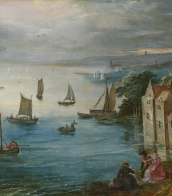

Michelangelo Merisi da Caravaggio, an Italian painter, was a pivotal figure in the transition to Baroque art. Born in Milan or the town of Caravaggio in 1571, his work is renowned for its realistic depiction of human emotion, dramatic use of lighting, and less-than-idealized portrayal of subjects, which broke away from the Mannerist style prevalent at the time.
Caravaggio's life was as dramatic as his art. In 1592, he moved to Rome, where, despite initial hardships, his unique style caught the eye of Cardinal Francesco del Monte, leading to his first public commissions. His success, however, was marred by a tumultuous life filled with brawls and legal troubles. Notably, in 1606, he fled Rome after killing Ranuccio Tommasoni in a brawl, an act that led to a death sentence. He sought refuge in Naples, Malta, and Sicily, continuing to create influential works while attempting to secure a papal pardon.
His most significant contributions to art include introducing a style that combined naturalistic detail with dramatic lighting (chiaroscuro) and psychological realism. This approach had a profound impact on the evolution of Baroque painting. Some of his notable works include "Basket of Fruit," "The Calling of St. Matthew," "The Beheading of St. John the Baptist," and "Supper at Emmaus." These works are characterized by their innovative composition and the intense emotional state they convey.
Caravaggio's fame waned after his death in 1610 under mysterious circumstances while traveling from Naples to Rome. However, the 20th century saw a resurgence in interest in his work, acknowledging his significant influence on Western art.
For collectors and art experts, Caravaggio's works represent a pivotal moment in the history of art, where the transition from Renaissance ideals to Baroque realism is profoundly evident. His paintings can be seen in various museums and galleries, offering a glimpse into the dramatic and emotive potential of art.
To stay updated on sales and auction events related to Caravaggio's works, signing up for updates can be a valuable resource for enthusiasts and collectors. This subscription will provide timely information on new opportunities to acquire pieces linked to this influential and groundbreaking artist.
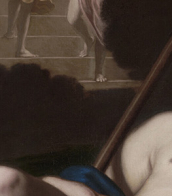

Michelangelo Merisi da Caravaggio, an Italian painter, was a pivotal figure in the transition to Baroque art. Born in Milan or the town of Caravaggio in 1571, his work is renowned for its realistic depiction of human emotion, dramatic use of lighting, and less-than-idealized portrayal of subjects, which broke away from the Mannerist style prevalent at the time.
Caravaggio's life was as dramatic as his art. In 1592, he moved to Rome, where, despite initial hardships, his unique style caught the eye of Cardinal Francesco del Monte, leading to his first public commissions. His success, however, was marred by a tumultuous life filled with brawls and legal troubles. Notably, in 1606, he fled Rome after killing Ranuccio Tommasoni in a brawl, an act that led to a death sentence. He sought refuge in Naples, Malta, and Sicily, continuing to create influential works while attempting to secure a papal pardon.
His most significant contributions to art include introducing a style that combined naturalistic detail with dramatic lighting (chiaroscuro) and psychological realism. This approach had a profound impact on the evolution of Baroque painting. Some of his notable works include "Basket of Fruit," "The Calling of St. Matthew," "The Beheading of St. John the Baptist," and "Supper at Emmaus." These works are characterized by their innovative composition and the intense emotional state they convey.
Caravaggio's fame waned after his death in 1610 under mysterious circumstances while traveling from Naples to Rome. However, the 20th century saw a resurgence in interest in his work, acknowledging his significant influence on Western art.
For collectors and art experts, Caravaggio's works represent a pivotal moment in the history of art, where the transition from Renaissance ideals to Baroque realism is profoundly evident. His paintings can be seen in various museums and galleries, offering a glimpse into the dramatic and emotive potential of art.
To stay updated on sales and auction events related to Caravaggio's works, signing up for updates can be a valuable resource for enthusiasts and collectors. This subscription will provide timely information on new opportunities to acquire pieces linked to this influential and groundbreaking artist.
